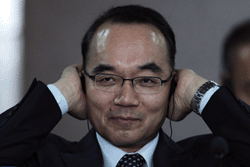 |
| South Korea’s finance minister, Bahk Jae-wan |
Bahk Jae-wan, around 18 months into his tenure as South Korea’s finance minister, is facing challenges on several fronts. Among Asian economies, South Korea’s is among the most exposed to problems elsewhere in the world. The eurozone crisis, introduction of Basle III, a slowdown in Chinese growth and ailing US treasuries all pose big potential threats. Bahk will have to perform a balancing act to steer the economy through the choppy waters ahead.
The eurozone crisis has inflicted considerable damage on South Korea, according to Bahk. He admits that because the country’s economy is so open compared with several others in the region, it is particularly vulnerable to external shocks.
"This is particularly the case in the shipbuilding sector, our exports of high-end products, and the manufacturing sector, more generally," he says.
However, Bahk also notes that although the eurozone crisis is causing problems, around 70% of South Korea’s exports are to emerging economies, which goes some way to limiting the direct impact of the crisis.
"Our financial markets have stabilized so we have the resources to overcome any near-term difficulties," he says. "However, our chief concern is depressed domestic sentiment towards consumption and investment, because of the weakness in the global economy.
"We expect a slight economic recovery, aided by the Bank of Korea’s monetary easing and government actions. However, this won’t be in the form of a V-shaped recovery. We will see only a slight recovery."
Calls for firmer action by policymakers in the eurozone to tackle the crisis have been growing louder for some time. As Bahk puts it: "The non-European countries are saying bolder measures are needed. The eurozone policymakers, on the other hand, are saying they are doing their best so there is that divergence of opinion. We accept there are many countries involved in the decision-making process in Europe but we feel frustrated at the slow pace of progress in resolving the crisis."
He suggests the eurozone should implement previously announced goals and stick to the timeline they have committed to. "The IMF is understandably playing a much smaller role in this crisis compared with the Asia crisis in the late-1990s, and one can understand why that’s the case," says Bahk. "But I do wish the IMF could be bolder and involve itself in the decision-making process, given its global leadership role."
Another issue for Bahk and his fellow finance ministers across the region is the impact of Basle III. He says aspects of the reform framework need to be examined further to assess its impact in developing countries. "Specifically, I am concerned about the implementation of higher capital rules for so-called domestic systemically important financial institutions (Sifis) in developing markets," he says. "There should be differentiation in the regulatory approach for global Sifis compared with domestic Sifis in emerging markets because financial markets in developing countries are not as liquid or deep."
He says the industry needs to look at how new regulations will affect local subsidiaries of global banks in emerging markets, see how these units should be defined, and whether they should be subject to the global or domestic Sifi requirement, or a third benchmark.
"Nevertheless, I agree with the direction of Basle III and, generally speaking, we want the framework to be implemented and don’t want the reform process to be slowed down by global market volatility," says Bahk.
The problems faced by South Korea are not confined to those emanating from Europe. A large portion of the Bank of Korea’s $300 billion foreign-exchange reserves are invested in US treasuries in an era of low yield, large-scale Federal Reserve intervention in the bond market and rising US fiscal risks.
Bahk displays a flair for diplomacy when asked if he is concerned about US treasuries. "This is a controversial issue; it would be inappropriate, as a policymaker, to be outwardly negative about the dollar and declare our intention to reduce our US treasury holdings," he says.
"It is important to say that we accept that US treasuries are still seen as a prime, or safe, global asset, even though some are concerned there is a bubble in the bond market."
Bahk has jokingly coined the phrase "irresponsible optimism" to explain that, while South Korea does not feel particularly comfortable about the US fiscal position, it remains optimistic. In comparison with the eurozone, he notes, the US more obviously has the capacity and institutions in place to sort out its problems.
"I also don’t think Korea should be unilaterally critical of the Fed policy of quantitative easing," he says. "The US has limited fiscal space, so the best way to create economic vitality is through monetary policy, which, in turn, will help the global economy.
"However, we have to be vigilant about the impact of QE on commodity prices and inflation in emerging markets through large-scale capital flows. We are not comfortable about the US fiscal position but we don’t want to take a one-sided critical view."
The minister, while keeping an eye on threats from the west, cannot afford to take his eye off problems closer to home.
China accounts for a large proportion of South Korean exports; China’s economic health is crucial to South Korea’s fortunes. On the prospects for China, Bahk is bullish. "There is a very low probability of a hard landing for the Chinese economy," he says. "In any case, the diversification of our manufacturing and services industry helps to some extent to shield us from global economic volatility."